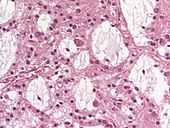Dysembryoplastic neuroepithelial tumour
From Wikipedia, the free encyclopedia
| Dysembryoplastic neuroepithelial tumour | |
|---|---|
| Classification and external resources | |
 DNET | |
| ICD-O: | 9413/0 |

Dysembryoplastic neuroepithelial tumour, MRI FLAIR.
Dysembryoplastic neuroepithelial tumour, commonly abbreviated DNT or DNET, is a type of brain tumour.
Defined as "an usually supratentorial glial-neuronal neoplasm occurring in children and young adults and characterized by a predominantly cortical location and by drug-resistant partial seizures" [1]
It appears similar to oligodendroglioma, but with visible neurons.[2]
It is a benign tumor (Grade I of the WHO classification of brain tumours).[3][4]
Treatment
Treatment of DNTs is usually surgical resection.[6]
See also
References
- ↑ WHO Classification of Tumours of the Central Nervous System. WHO. 2007. ISBN 978-9283224303.
- ↑ O'Brien DF; Farrell M; Delanty N et al. (December 2007). "The Children's Cancer and Leukaemia Group guidelines for the diagnosis and management of dysembryoplastic neuroepithelial tumours". Br J Neurosurg 21 (6): 539–49. doi:10.1080/02688690701594817. PMID 18071981.
- ↑ Daumas-Duport C, Scheithauer B, Chodkiewicz J, Laws E, Vedrenne C (1988). "Dysembryoplastic neuroepithelial tumor: a surgically curable tumor of young patients with intractable partial seizures. Report of thirty-nine cases". Neurosurgery 23 (5): 545–56. doi:10.1227/00006123-198811000-00002. PMID 3143922.
- ↑ Salah Uddin ABM, Jarmi T. Oligodendroglioma. eMedicine.com. URL: http://www.emedicine.com/neuro/topic281.htm. Accessed on: April 9, 2007.
- ↑ Campos AR; Clusmann H; von Lehe M et al. (February 2009). "Simple and complex dysembryoplastic neuroepithelial tumors (DNT) variants: clinical profile, MRI, and histopathology". Neuroradiology 51 (7): 433–43. doi:10.1007/s00234-009-0511-1. PMID 19242688.
- ↑ Ray WZ; Blackburn SL; Casavilca-Zambrano S et al. (March 2009). "Clinicopathologic features of recurrent dysembryoplastic neuroepithelial tumor and rare malignant transformation: a report of 5 cases and review of the literature". J. Neurooncol. 94 (2): 283–92. doi:10.1007/s11060-009-9849-9. PMID 19267228.
External links
- Dysembryoplastic neuroepithelial tumour - www.childrenshospital.org
| ||||||||||||||||||||||||||||||||||||||||||||||||||||||||||||
This article is issued from Wikipedia. The text is available under the Creative Commons Attribution/Share Alike; additional terms may apply for the media files.